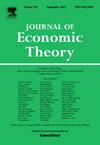弹性的进化
IF 1.2
3区 经济学
Q3 ECONOMICS
引用次数: 0
摘要
我分析了一个社会进化模型,在这个模型中,存在一种非排他性的公共利益,可以减少灾难发生的可能性。我的研究表明,虽然在固定的人口中,生产公共产品的有弹性的类型无法与其他更自私的类型进行正面竞争,但如果灾难减少了人口,它们就能生存下来。本文章由计算机程序翻译,如有差异,请以英文原文为准。
The evolution of resilience
I analyze a social evolutionary model in which there is a non-excludable public good that reduces the chances of catastrophe. I show that while resilient types that produce the public good cannot survive head-to-head competition with other more selfish types in a fixed population, they do if catastrophes reduce population.
求助全文
通过发布文献求助,成功后即可免费获取论文全文。
去求助
来源期刊

Journal of Economic Theory
ECONOMICS-
CiteScore
2.50
自引率
12.50%
发文量
135
期刊介绍:
The Journal of Economic Theory publishes original research on economic theory and emphasizes the theoretical analysis of economic models, including the study of related mathematical techniques. JET is the leading journal in economic theory. It is also one of nine core journals in all of economics. Among these journals, the Journal of Economic Theory ranks fourth in impact-adjusted citations.
 求助内容:
求助内容: 应助结果提醒方式:
应助结果提醒方式:


